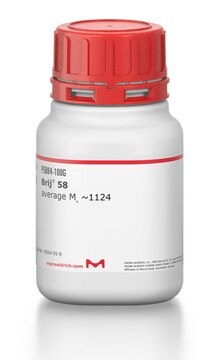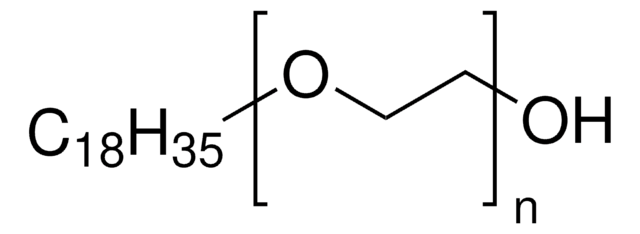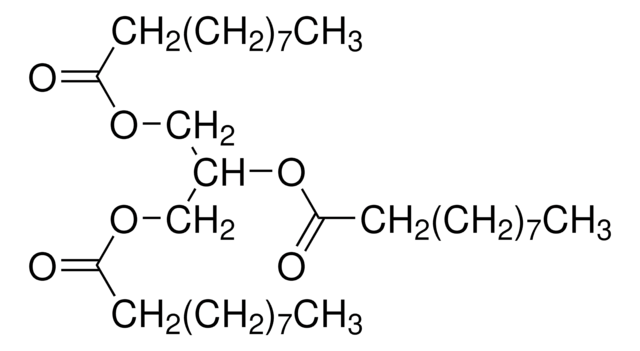P4019
Brij® S20
Synonyme(s) :
Polyethylene glycol octadecyl ether, Polyoxyethylene (20) stearyl ether
About This Item
Produits recommandés
Forme
solid
Niveau de qualité
Pf
44-46 °C (lit.)
HLB
15
Chaîne SMILES
CCCCCCCCCCCCCCCCCCOCCOCCOCCOCCOCCOCCOCCOCCOCCOCCOCCOCCOCCOCCOCCOCCOCCOCCOCCOCCO
InChI
1S/C20H41O2/c1-2-3-4-5-6-7-8-9-10-11-12-13-14-15-16-17-19-22-20-18-21/h2-20H2,1H3
Clé InChI
PSEGVHKUPXNGGJ-UHFFFAOYSA-N
Vous recherchez des produits similaires ? Visite Guide de comparaison des produits
Catégories apparentées
Description générale
Application
- Nanostructured lipid carriers for oral delivery of silymarin: Improving its absorption and in vivo efficacy in type 2 diabetes and metabolic syndrome model.: This study utilizes Brij® S20 to develop nanostructured lipid carriers for oral delivery of silymarin. The findings demonstrate enhanced absorption and efficacy of silymarin in treating type 2 diabetes and metabolic syndrome, highlighting the potential of Brij® S20 in improving drug delivery systems. (Piazzini et al., 2019).
- Water-stable all-biodegradable microparticles in nanofibers by electrospinning of aqueous dispersions for biotechnical plant protection.: The study uses Brij® S20 to create water-stable, biodegradable microparticles in nanofibers through electrospinning. These microparticles are designed for biotechnical plant protection, demonstrating the potential of Brij® S20 in agricultural biotechnology. (Bansal et al., 2012).
Informations légales
Produit comparable
Mention d'avertissement
Warning
Mentions de danger
Conseils de prudence
Classification des risques
Acute Tox. 4 Oral
Code de la classe de stockage
11 - Combustible Solids
Classe de danger pour l'eau (WGK)
WGK 2
Point d'éclair (°F)
Not applicable
Point d'éclair (°C)
Not applicable
Équipement de protection individuelle
Eyeshields, Gloves, type N95 (US)
Certificats d'analyse (COA)
Recherchez un Certificats d'analyse (COA) en saisissant le numéro de lot du produit. Les numéros de lot figurent sur l'étiquette du produit après les mots "Lot" ou "Batch".
Déjà en possession de ce produit ?
Retrouvez la documentation relative aux produits que vous avez récemment achetés dans la Bibliothèque de documents.
Les clients ont également consulté
Notre équipe de scientifiques dispose d'une expérience dans tous les secteurs de la recherche, notamment en sciences de la vie, science des matériaux, synthèse chimique, chromatographie, analyse et dans de nombreux autres domaines..
Contacter notre Service technique





